In a preemptive legal move, Lagos State Governor Babajide Sanwo-Olu has reportedly filed a lawsuit against the Economic and Financial Crimes Commission (EFCC) over an alleged plan to arrest and prosecute him following the end of his term in office. The governor’s suit challenges the EFCC’s actions, arguing they lack grounds for investigation or prosecution, and that such a move could amount to political harassment.
Details of the Allegations and Suit
Governor Sanwo-Olu, who is serving his second term in Lagos, has taken legal steps to address what he claims are speculative plans by the EFCC to arrest and prosecute him once he leaves office. While specific details of the alleged charges have not been disclosed, the governor’s legal team suggests that the EFCC’s investigations may be linked to financial dealings or administrative decisions made during his tenure.
The suit, filed in a federal high court, seeks a restraining order that would prevent the EFCC from detaining or prosecuting him on issues related to his time in office, unless concrete evidence is brought forward. Sanwo-Olu’s legal representatives argue that the EFCC’s actions are premature and, if unchallenged, could set a dangerous precedent for politically motivated investigations against public officials.

Political and Legal Context
The lawsuit is unusual but not unprecedented in Nigeria’s political landscape, where governors and other high-ranking officials often find themselves under scrutiny by anti-corruption agencies following their tenures. Although Nigerian law grants immunity from prosecution to sitting governors and federal executives, this immunity expires once officials leave office, opening them up to investigations for alleged misconduct during their time in public service.
Governor Sanwo-Olu’s legal move comes amid a broader climate where political figures increasingly seek legal protection from potential post-tenure investigations. The suit brings to light the perceived challenges in Nigeria’s legal and political system, where accusations of corruption are often entangled with politics, raising concerns about the balance between accountability and political harassment.
The EFCC’s Role and Response
The Economic and Financial Crimes Commission has not yet publicly commented on the specifics of Sanwo-Olu’s suit. However, as Nigeria’s leading anti-corruption agency, the EFCC is mandated to investigate financial improprieties and fraud cases involving public officials and institutions. Over the years, the commission has gained a reputation for pursuing high-profile cases against former governors, ministers, and other public officials, often following the expiration of their legal immunity.
Critics of the EFCC, however, argue that its operations can be politicized, with investigations and charges sometimes coinciding with inter-party rivalries or factional disputes. Despite these criticisms, the agency remains a powerful force in Nigeria’s anti-corruption efforts, often securing convictions in cases where evidence of fraud or mismanagement is strong.
If Sanwo-Olu’s suit succeeds, it could impact the agency’s approach to similar cases in the future, potentially requiring the EFCC to demonstrate substantial evidence before initiating investigations or arrests of former governors.
**Public and Political Reactions**
Sanwo-Olu’s decision to sue the EFCC has sparked a range of reactions from political observers, civil society, and the general public. Supporters of the governor argue that the suit is a necessary measure to prevent undue harassment of a sitting official with no confirmed allegations against him. They believe this legal preemptive step could protect future officials from similar circumstances, ensuring that only cases with concrete evidence of misconduct proceed.
Conversely, some critics argue that the governor’s move could appear as an attempt to shield himself from accountability. They contend that officials who have served transparently and with integrity should have little reason to worry about post-tenure investigations, and that legal actions like this might encourage a culture of evasion among public officials.
Civil society groups and anti-corruption advocates are observing the case closely, with many emphasizing the importance of due process. They argue that while public officials should be protected from baseless investigations, genuine allegations of financial misconduct must be thoroughly investigated to maintain the public’s trust in Nigeria’s anti-corruption institutions.
**Implications for Nigerian Governance**
The outcome of this case could have broader implications for Nigerian governance and the treatment of former public officials. If Sanwo-Olu’s suit succeeds, it could establish a legal precedent that requires the EFCC and other investigative bodies to demonstrate stronger preliminary evidence before pursuing investigations against former governors and officials. Such a precedent might bring more accountability to the anti-corruption process, reducing the risk of politically motivated actions.
On the other hand, some legal experts caution that setting restrictive guidelines for anti-corruption investigations could weaken Nigeria’s oversight mechanisms, allowing potential cases of financial mismanagement to go unexamined. They argue that maintaining a balance between protecting officials from harassment and ensuring accountability for public funds is essential to sustaining public trust.
**Conclusion**
Governor Babajide Sanwo-Olu’s lawsuit against the EFCC highlights the complex intersection of politics, governance, and anti-corruption efforts in Nigeria. As the case proceeds, it will not only determine the future legal standing of the governor post-tenure but may also influence the approach of anti-corruption agencies toward former officials across the country.
This legal battle underscores the need for clear guidelines to prevent both unchecked political harassment and accountability evasion, aiming ultimately to strengthen Nigeria’s governance and anti-corruption framework. The public, political observers, and legal experts will be watching closely, as the court’s ruling could shape the future of anti-corruption efforts and political accountability in Nigeria.
Support InfoStride News' Credible Journalism: Only credible journalism can guarantee a fair, accountable and transparent society, including democracy and government. It involves a lot of efforts and money. We need your support. Click here to Donate
